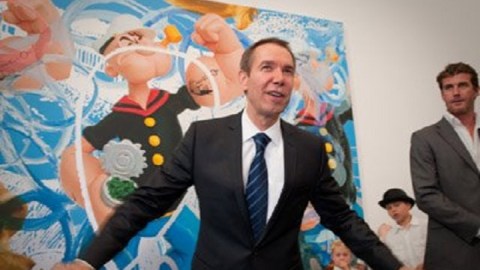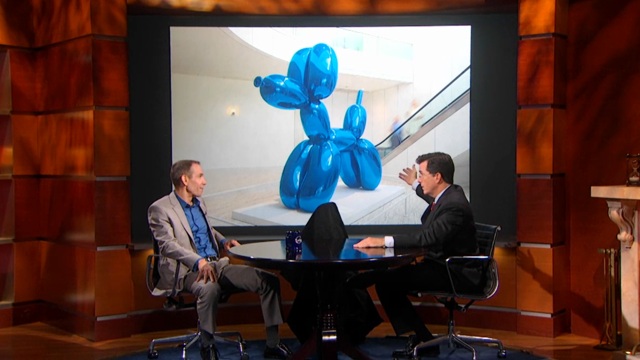Dearth of a Salesman: The Jeff Koons Show

There’s a telling moment early on in Alison Chernick’s 2004 film The Jeff Koons Show, now available on DVD from Microcinema. Jeff Koons muses on his idyllic childhood and how he sold candy and gift wrap door to door as a very young boy. Whenever someone opened their door to the ever-smiling, ever-earnest Koons, he admits, he became whatever they wanted him to be. Koons the artist remains the eternal salesman, pitching a brand of art that seems to many to be big on talk and low on substance. It’s the dearth of this salesman’s art that Chernick’s documentary dances around, leaving it to us to decide whether we buy Koons’ message of art for the masses through kitsch and almost convulsively bad taste.
The Jeff Koons Show stars Koons himself, who amiably opened up his life to the filmmaker. Home movies and old photos accompany Koons’ retelling of his early days. It’s unsettling to see how the smile and twinkling eyes established themselves early on, as if Koons the artist sprung fully formed from his mother’s womb. Chernick then moves through a comprehensive retelling of Koons’ artistic career interspersed with behind the scenes footage of Koons directing the workmen who put Koons’ ideas into reality.
It comes as almost a stunning revelation that Koons actually once painted. He claims that moving to New York City in 1977 drove him to stop painting. Surrounded by the raging art scene, Koons decided that originality no longer had any value. Koons soon got a job at the MoMA working at the subscriptions desk. Dressing up each day in outlandish outfits, Koons drew attention to himself and increased business for the MoMA in a move that some consider his first artistic statement. Koons the salesman and Koons the artist were quickly becoming one and the same.
Koons’ exhibitions of “The New,” in which factory fresh vacuum cleaners and other consumer products were exalted as fine art; “Banality,” where Koons’ kitschy inflated animals first emerged and won him fame; and “Made in Heaven,” where Koons and porn star Ilona Staller, aka, “Cicciolina” (“the fleshy one” in Italian), put the sexuality of their marriage on display, all get in-depth treatment against a backdrop of commentary from critics and artists such as Julian Schnabel and Chuck Close. When people such as Schnabel and Close take Koons seriously, it’s hard not to argue against him. The consensus opinion of Koons is that he’s the great democratic artist confronting the art world with its own elitism. The banality and bad taste of his art purposively strives to remove any guilt we may feel over enjoying such things in our lives. Koons becomes in their collective eyes the bastard child of Andy Warhol. If Warhol predicted the modern version of celebrity, Koons predicted the modern version of branding, making himself a brand name artist, one critic argues. Koons surpasses Warhol as a post-modernist by completely rejecting originality, something even Warhol clung to however tenuously.
It takes a lot of guts to announce, as Koons does, that he’s the most important artist at the end of the 20th century, with only Picasso and Duchamp as his peers in the century. Koons not only believes that pronouncement, but he vehemently states that he “wants” that responsibility, something that few artists would accept. Before Koons can convince us of his art, he has to convince himself, something he’s done, well, convincingly, to judge from this film. The beauty of The Jeff Koons Show, with its slightly off-kilter soundtrack to match this off-kilter visionary, is that it puts all the goods out for display, leaving you to judge finally whether to buy or not. I can’t say that I’m buying it all—the shameless name dropping of everyone from Masaccio to Dali—but I will buy Chernick’s attempt to give us some substance on this salesman of thin air.
[Many thanks to Microcinema for providing me with a review copy of The Jeff Koons Show.]





